In observance of the March 24, 2003 death of screenwriter Philip Yordan, one of Hollywood’s most mercurial and elusive talents, let’s take a look 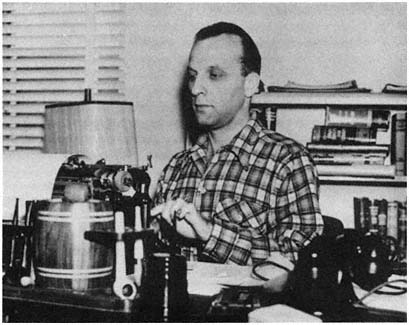 at some of his films. All of the following were written by—or at least credited to—Mr. Yordan, who, as history has proven, was quite a tricky fellow.
at some of his films. All of the following were written by—or at least credited to—Mr. Yordan, who, as history has proven, was quite a tricky fellow.
Yordan was best known for scripting Hollywood classics like DILLINGER (1945), GOD’S LITTLE ACRE (1958), KING OF KINGS (1961) and quite a few others. His notoriety ensues from the fact that he “fronted” for blacklisted writers in the fifties, although, truthfully, nearly all his scripts from before and after the blacklist period were penned in whole or part by other hands. Indeed, screenwriter Ben Maddow, one of Yordan’s frequent “collaborators,” claims the latter “never wrote a sentence in his life.”
What does this have to with the latter stretch of Yordan’s career, devoted to a series of horror/exploitation flicks? Yordan clearly had a longtime predilection for the bizarre, as evinced by his work on films like JOHNNY GUITAR (1954) and THE DAY OF THE TRIFFIDS (1962). Of course, it’s since been revealed that the real authors of those films were, respectively, Ben Maddow and Bernard Gordon. Could it be that others were behind the scripts of later Yordan opuses like DEATH WISH CLUB and BLOODY WEDNESDAY? If so, the “real” writers have yet to come forward.
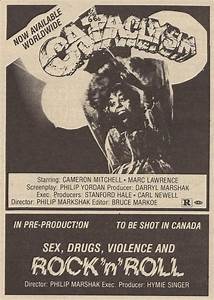 What seems evident is that Yordan, unlike many of his contemporaries, refused to pass quietly into old age. Ever resourceful, Yordan used the early eighties video market to his advantage in much the same way he exploited the Blacklist. In the early days of video Hollywood was weary of this then-revolutionary medium. The big studios kept their product off the home video market, leaving a void filled by smaller companies like Regal, Saturn and Academy, who released cheap and obscure films in oversized boxes of the type favored by porno outfits.
What seems evident is that Yordan, unlike many of his contemporaries, refused to pass quietly into old age. Ever resourceful, Yordan used the early eighties video market to his advantage in much the same way he exploited the Blacklist. In the early days of video Hollywood was weary of this then-revolutionary medium. The big studios kept their product off the home video market, leaving a void filled by smaller companies like Regal, Saturn and Academy, who released cheap and obscure films in oversized boxes of the type favored by porno outfits.
Case in point: CATACLYSM (a.k.a. THE NIGHTMARE NEVER ENDS and SATAN’S SUPPER), a bizarre no budgeter scripted by Yordan and credited to three directors. Based on the horrendously confusing and inconsistent results, it’s a good bet that the three helmers—Philip Marshak, Tom McGowan and Gregg C. Talls—did not enjoy a harmonious collaboration. Their work is ably complemented by Yordan’s script, which is so unbelievably convoluted it’s either terrible (it definitely violates every screenwriting rule extolling the virtues of simplicity!) or some kind of outside-the-box masterpiece.
The impossible-to-follow story involves a secret Nazi gathering where several Jewish prisoners are indiscriminately mowed down, a female surgeon suffering from horrific nightmares (played by the horrifically untalented Faith Clift, a.k.a. Mrs. Philip Yordan), an old Jewish guy looking to hunt down the antichrist, a writer (played by NIGHT COURT’S Richard Moll…with hair!) who pens a tome called GOD IS DEAD, a theologically minded bum and the Devil Himself. This is an awful lot to swallow in a mere 94 minutes, and the nonexistent production values, terrible acting and choppy editing don’t make it go down any easier.
The end result is an appalling yet curiously fascinating oddity that set the tone for the remainder of Yordan’s no-budget opuses. I’ve no idea precisely how involved Yordan was in the production of CATACLYSM or any of the subsequent films, but they all have a uniform feel.
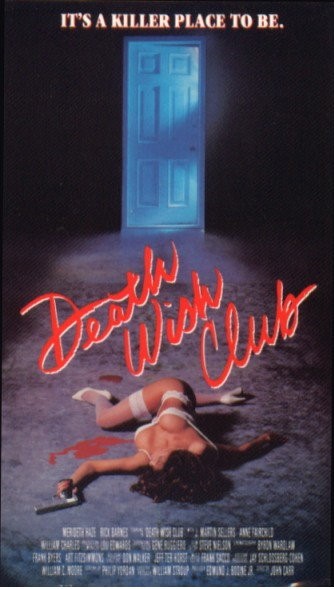 On to 1984’s mind boggling DEATH WISH CLUB (a.k.a. GRETTA and CARNIVAL OF FOOLS). It followed the evangelical production SAVAGE JOURNEY (1983), a no-budget dramatization of the founding of the Mormon Church scripted by Yordan, directed by Tom McGowan (one of CATASCLYSM’s three helmers) and featuring a reteaming of CATACLYSM’S leads Richard Moll and Faith Clift-Yordan. It’s pretty worthless, but not so DEATH WISH CLUB, which is easily the “best” of the bunch. It marked the start of a longtime association with director John Carr, who went on to helm Yordan’s scripts for SCREAM YOUR HEAD OFF, DEAD GIRLS DON’T TANGO and TOO BAD ABOUT JACK (1994). Based on DEATH WISH CLUB’S qualities, or lack thereof, I assumed its director was an untried film school graduate; interestingly enough, it turns out that Carr was a twenty-year film and TV veteran when DEATH WISH CLUB was made.
On to 1984’s mind boggling DEATH WISH CLUB (a.k.a. GRETTA and CARNIVAL OF FOOLS). It followed the evangelical production SAVAGE JOURNEY (1983), a no-budget dramatization of the founding of the Mormon Church scripted by Yordan, directed by Tom McGowan (one of CATASCLYSM’s three helmers) and featuring a reteaming of CATACLYSM’S leads Richard Moll and Faith Clift-Yordan. It’s pretty worthless, but not so DEATH WISH CLUB, which is easily the “best” of the bunch. It marked the start of a longtime association with director John Carr, who went on to helm Yordan’s scripts for SCREAM YOUR HEAD OFF, DEAD GIRLS DON’T TANGO and TOO BAD ABOUT JACK (1994). Based on DEATH WISH CLUB’S qualities, or lack thereof, I assumed its director was an untried film school graduate; interestingly enough, it turns out that Carr was a twenty-year film and TV veteran when DEATH WISH CLUB was made.
In this peerlessly loopy concoction, a nice college boy (Rick Barnes) finds himself obsessed with porn star Gretta (Merideth Haze). He tracks her down, only to find a severely disturbed woman who, according to her elderly manager/boyfriend, “lives in the fourth dimension…it’s not a nice place there.” That doesn’t deter Barnes from becoming involved with Gretta, but he regrets his decision when she drags him to a gathering of the “Death Wish Club,” a band of death-obsessed freaks who play macabre variations on Russian roulette: a poisonous fly is let loose from a jar while they all sit around a table before it, a current is set to hit one of several electric chairs the gang is strapped into, and a bowling ball rotates over them on a rope that’s about to break. But the most outrageous twist is yet to come: it seems that Gretta has an alter ego in the form of Charlie, a man who in turn has a thing for a transvestite.
Believe it or not, that’s a severely abridged recounting of DEATH WISH CLUB’S free-form narrative. It’s more streamlined than CATACLYSM but just as convoluted, having the feel of a drunken campfire story that grows increasingly outrageous. The dialogue is priceless (early on Barnes asks Gretta “Why do you try so hard to hide the nice person inside of you?”), as are Yordan’s attempts at intentional humor (an elderly couple periodically show up with a stopwatch to listen to the protagonists having sex through their apartment wall!). Also worthy of note is the performance of the perfectly cast Merideth Haze; her acting style is pretty much summed up by her last name, but the disarmingly beautiful Merideth definitely has a distinctive screen presence. When she’s onscreen (playing a woman or a man), I guarantee you won’t be looking at anything else.
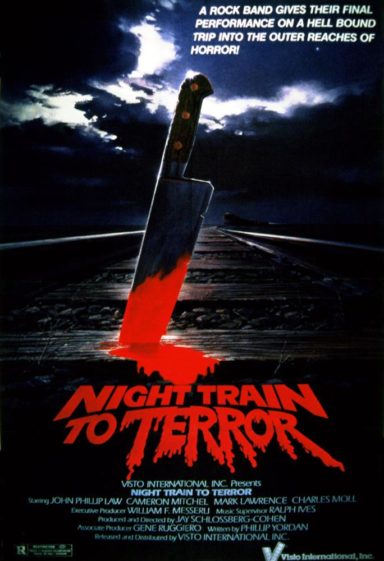 Such a film would be hard for anyone to follow up, and Yordan, it turns out, didn’t even try. 1985’s NIGHT TRAIN TO TERROR (a.k.a. SHIVER) is an anthology featuring abbreviated versions of the former two films along with a then-unfinished project called MARILYN ALIVE AND BEHIND BARS, all gussied up by extensive narration and occasional added bits (i.e. a young couple getting bit by a bug in the DEATH WISH CLUB portion, a tacky bit you won’t find in the feature version). In all cases, the original films are infinitely preferable to NIGHT TRAIN’S abridgements (MARILYN…, for its part, was completed in the nineties; more on that in a minute). What the film has in its favor is an wonderfully loony wraparound story featuring God and Satan debating mankind’s destiny aboard the “Heavenly Express” train, whose other passengers consist of a band of bickering break dancers who periodically break into embarrassing music numbers.
Such a film would be hard for anyone to follow up, and Yordan, it turns out, didn’t even try. 1985’s NIGHT TRAIN TO TERROR (a.k.a. SHIVER) is an anthology featuring abbreviated versions of the former two films along with a then-unfinished project called MARILYN ALIVE AND BEHIND BARS, all gussied up by extensive narration and occasional added bits (i.e. a young couple getting bit by a bug in the DEATH WISH CLUB portion, a tacky bit you won’t find in the feature version). In all cases, the original films are infinitely preferable to NIGHT TRAIN’S abridgements (MARILYN…, for its part, was completed in the nineties; more on that in a minute). What the film has in its favor is an wonderfully loony wraparound story featuring God and Satan debating mankind’s destiny aboard the “Heavenly Express” train, whose other passengers consist of a band of bickering break dancers who periodically break into embarrassing music numbers.
Produced and directed by Jay Schlossberg-Cohen, NIGHT TRAIN TO TERROR stands as a singularly awful concoction (a climactic train crash accomplished via a patently obvious model train is unforgettable) and a testament to Yordan’s resourcefulness in figuring out a way to wring further profit from his previous three projects.
Next up was 1987’s BLOODY WEDNESDAY, directed by Mark G. Gilhuis from a script by Yordan, 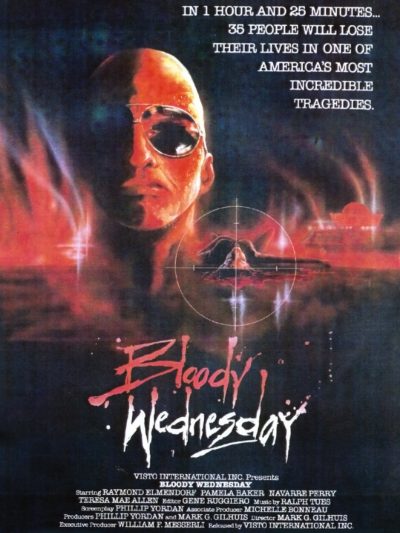 who attempt a dramatization of a massacre in San Ysidro, CA, where a deranged man shot up a McDonald’s in July 1984. This dime store epic, also known as THE GREAT AMERICAN MASSACRE, starts out promisingly, with its severely disturbed auto mechanic “hero” (Raymond Elmendorf) losing his head on the job and somehow ending up in a deserted hotel, but the film goes downhill fast. Despite one hilariously overwrought sequence where the protagonist’s teddy bear pronounces sentence on a trio of punks, the movie overall is little more than a poor man’s SHINING. Elmendorf stumbles upon a hallucinatory party where he accidentally pushes a woman out a window, and is led to a box supposedly containing untold wealth that turns out to be full of snakes. It ends with Elmendorf shooting up a coffee shop with a machine gun bequeathed by one of the aforementioned punks (the one Teddy proclaimed not guilty), a poorly staged sequence that drags on forever.
who attempt a dramatization of a massacre in San Ysidro, CA, where a deranged man shot up a McDonald’s in July 1984. This dime store epic, also known as THE GREAT AMERICAN MASSACRE, starts out promisingly, with its severely disturbed auto mechanic “hero” (Raymond Elmendorf) losing his head on the job and somehow ending up in a deserted hotel, but the film goes downhill fast. Despite one hilariously overwrought sequence where the protagonist’s teddy bear pronounces sentence on a trio of punks, the movie overall is little more than a poor man’s SHINING. Elmendorf stumbles upon a hallucinatory party where he accidentally pushes a woman out a window, and is led to a box supposedly containing untold wealth that turns out to be full of snakes. It ends with Elmendorf shooting up a coffee shop with a machine gun bequeathed by one of the aforementioned punks (the one Teddy proclaimed not guilty), a poorly staged sequence that drags on forever.
Yordan followed BLOODY WEDNESDAY with the same year’s Bigfoot themed “thriller” CRY WILDERNESS. Directed yet again by Jay Schlossberg-Cohen, the film is an attempt at a more family-friendly brand of horror, as seen in HARRY AND THE HENDERSONS and BIGFOOT (both of which likewise hailed from 1987). Frankly they shouldn’t have bothered, as the film is an unimaginative and misconceived hodgepodge. It involves a young boy (Eric Foster) who befriends a bigfoot and gets involved in a wilderness hunt for an escaped tiger, spearheaded by his park ranger father. Said hunt takes up much of the runtime, an agonizingly drawn-out, suspense free jaunt that completely overshadows the bigfoot narrative, which for its part involves an evil big game hunter, a kindly Native American, a magic amulet and a guy in a poorly constructed sasquatch costume. Ms. Clift also makes a return in a small but memorable (because her acting is so inept) role.
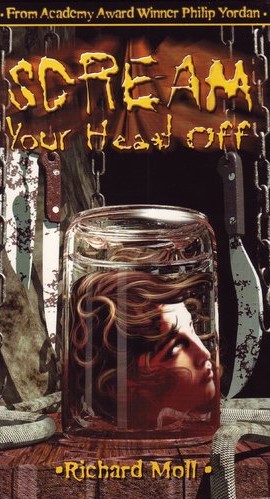 Following THE UNHOLY (1988), a middling mainstream horror flick Yordan is credited with co-scripting, was the long-awaited 1992 release of SCREAM YOUR HEAD OFF (a.k.a. MARILYN ALIVE AND BEHIND BARS), NIGHT TRAIN’S “unfinished” segment. Then again, “finished” isn’t really the word I’d use to describe the John Carr directed SCREAM YOUR HEAD OFF. “Pieced together” is a more accurate description of this film, which comes complete with an ultra-tacky opening credit scroll over a painted backdrop. Packed with cast members from the earlier films, including DEATH WISH CLUB’S Rick Barnes and Richard Moll, it’s even clumsier and more incoherent than CATACLYSM, with much patently mismatched film stock (the film’s various sequences were clearly shot at different periods).
Following THE UNHOLY (1988), a middling mainstream horror flick Yordan is credited with co-scripting, was the long-awaited 1992 release of SCREAM YOUR HEAD OFF (a.k.a. MARILYN ALIVE AND BEHIND BARS), NIGHT TRAIN’S “unfinished” segment. Then again, “finished” isn’t really the word I’d use to describe the John Carr directed SCREAM YOUR HEAD OFF. “Pieced together” is a more accurate description of this film, which comes complete with an ultra-tacky opening credit scroll over a painted backdrop. Packed with cast members from the earlier films, including DEATH WISH CLUB’S Rick Barnes and Richard Moll, it’s even clumsier and more incoherent than CATACLYSM, with much patently mismatched film stock (the film’s various sequences were clearly shot at different periods).
The story (from what I could tell) is about a sanitarium run by corrupt doctors who kidnap, brainwash and sell attractive women to corrupt Middle Easterners. Those who don’t make the cut are chopped up, with their body parts sold to medical schools. One of the protagonists is a horny female doctor who, when her sidekick tries to get rid of her boy toy sex slave, has her partner lobotomized—and so on. I honestly couldn’t make out what ultimately happened, as the editing became so choppy and haphazard I simply gave up.
Yordan reteamed with John Carr for DEAD GIRLS DON’T TANGO, which was also released in 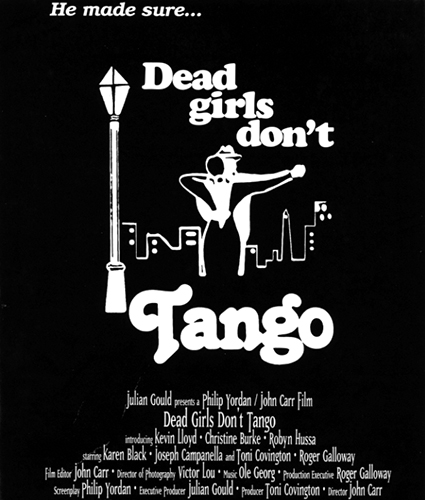 1992, and was also pieced together from a project lensed years earlier. It’s been claimed that the film was actually shot in 1975, although the hairstyles and synthesizer-heavy score are redolent of the early-to-mid 1980s. It’s a disaster in any event, a thoroughly lackluster serial killer drama about an eccentric projectionist (Kevin Lloyd) who may or may not be the “serial strangler” terrorizing the surrounding community. The acting, once again, is atrocious, even in the case of “guest star” Karen Black as a leggy police inspector, and the quirky-bizarre flourishes that distinguished CATACLYSM and DEATH WISH CLUB are nowhere to be found (aside from a clip from DEATH WISH CLUB, and also the title SCREAM YOUR HEAD OFF on a movie theater marquee).
1992, and was also pieced together from a project lensed years earlier. It’s been claimed that the film was actually shot in 1975, although the hairstyles and synthesizer-heavy score are redolent of the early-to-mid 1980s. It’s a disaster in any event, a thoroughly lackluster serial killer drama about an eccentric projectionist (Kevin Lloyd) who may or may not be the “serial strangler” terrorizing the surrounding community. The acting, once again, is atrocious, even in the case of “guest star” Karen Black as a leggy police inspector, and the quirky-bizarre flourishes that distinguished CATACLYSM and DEATH WISH CLUB are nowhere to be found (aside from a clip from DEATH WISH CLUB, and also the title SCREAM YOUR HEAD OFF on a movie theater marquee).
It’s no surprise that, after such a disaster, Yordan’s career as an exploiteur did a slow fade. His final hurrah came in purchasing the rights to all the above films and re-releasing them on (cheaply made EP speed) video in 1997, through the now-defunct Simitar label.
What can we deduce from this Academy Award-winning screenwriter’s wallow in exploitation? Could it be that, after forty years in the Hollywood trenches, Yordan was finally letting his true nature shine through in freaky tales of Satan worship, mind control, hallucinations, dismemberment and mass murder? Or was Yordan desperately trying to prolong his sagging career with a tawdry series of films aimed at the lowest common denominator? No answers are forthcoming, from Yordan or anyone else. As the French critic/filmmaker Bertrand Tavernier (who claims an interview conducted with Yordan resulted in “a tissue of lies”) has observed, when it came to Philip Yordan nothing was ever certain.
